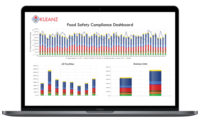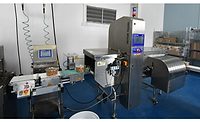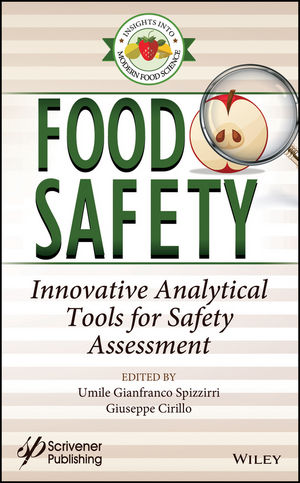Melding Beef Product Quality and Safety

Since its founding in 1978, the Certified Angus Beef brand in Wooster, OH, has helped restaurants and grocery stores identify and market premium fresh beef to consumers. The not-for-profit program representing American Angus Association cattle ranchers does not own cattle or beef, yet it aligns with food businesses at every level—packers, processors, distributors and retailers—to package and market beef meeting strict quality standards.
As the brand’s fresh meat sales grew into the 1980s, customer demand emerged for value-added items like deli meats and frankfurters. The staff’s need for greater understanding of processed meats became top priority.
“Third-party quality audits and HACCP [Hazard Analysis and Critical Control Points] were useful tools from the start,” says Brett Erickson, director of value-added products. “They gave us information about processors as well, but growing need for consumer transparency in the industry requires new insight on food safety.”
The staff’s search led to the Global Food Safety Initiative (GFSI) in 2012. While relatively new in the United States then, the third-party certification was gaining recognition as one of the most stringent food safety certifications in the world. It complemented the Certified Angus Beef brand’s fine quality and offered a universal code for sharing product and food safety information with multiple processors of all product types and plant sizes.
By June 2012, the beef brand began requiring GFSI certification for new processors and then started working with existing processors to make the transition, allowing them to choose the accrediting program. Staff found many processors already considering GFSI certification, most through its U.S.-based Safe Quality Food (SQF) program. Within SQF’s three tiers, the beef brand requires Level 2 certification for food safety or Level 3 with added quality management measures. Some processors who have worked through the food safety requirements are eyeing Level 3.
“We are fortunate to be associated with dedicated manufacturer-processors who embraced this opportunity to minimize risks by sharpening the food safety culture within their facilities,” Erickson says. “Once we explained how it can be benchmarked to all food safety certifications required by their customers, they wanted to know more.”
One of those processors is Hudson Meat Company in Columbus, OH, where brothers Dan and Jeff Emmenegger use sous vide to cook deli meats, pot roast, prime rib and short ribs. Along with the consistency gained through this slow-cooking method, most products are custom-processed using customer-supplied fresh meats, offering a unique niche in the market. Many items have been Certified Angus Beef product since 1989, when Hudson became one of the brand’s first value-added processors.
“GFSI certification was important to us because it was important to the Certified Angus Beef brand,” says Dan Emmenegger, Hudson’s president. “Our customers were not requiring it yet, but we wanted to be a step ahead of the game and open doors to new business.”
The family-owned processor was already maintaining HACCP approval, so Dan Emmenegger was hesitant about adding costs for staff time, hiring a consultant or buying new equipment. He now says the expense has been worthwhile, with a primary focus on rewording Standard Operating Procedures to match the SQF code.
Hudson Meat finalized the desk audit in April 2014, making minor wording adjustments. The Emmeneggers also worked through a plant audit with a consultant to prepare for the official plant certification audit in May. The company is now certified (see “Developing a Food Safety Focus”).
“We are now organized in a way that helps us level the field with large processors,” Dan Emmenegger says. “Plus, our employees are more actively involved. They need to understand why we do what we do and will take an active role in plant audits.”
At Old World Provisions in Troy, NY, Vice President Ross Shuket says he has gained insight into his team as well.
“We learned that when given the right tools and defined objectives, our facilities and staff can exceed all expectations,” Shuket says. “Becoming GFSI certified has allowed our current and potential customers to understand and believe in the work we are doing, too, and with that comes increased sales and growth.”
Shuket had also heard about the extensive amount of paperwork and the difficulty for first-time applicants to pass. “Day-to-day management of the extensive paperwork can be challenging, but it holds our plants responsible and allows us to improve every day,” he says. “We wanted to make sure we were meeting and exceeding any new industry expectations, and we are.”
In Salisbury, NC, Freirich Food Products also focuses on being a step ahead of industry regulations. It was an early adopter of HACCP in the 1990s, so GFSI certification seemed like a logical next step.
“Once you get to the point of passing all those third-party certifications, this didn’t require much work,” says Freirich CEO Paul Bardinas. “We refined our manual to fit within the SQF framework. The pieces were there–we just had to organize them for the new code.”
Bardinas also noted how the universal certification has made doing business easier. “Once we became certified, customers no longer need to send their own audit groups to our plant,” he says. “We only have one audit group now, and under this umbrella, all of our customers’ needs are met.”
As the beef brand approaches two years into this transition, 85 percent of its manufacturer-processors are GFSI certified. More are expected to be approved this year. All are moving a step ahead of the federal Food Safety Modernization Act.
“We are pleased with our progress and appreciate their ongoing dedication to our brand,” Certified Angus Beef’s Brett Erickson says. “Food safety assurances have evolved significantly over the years, and we are proud to be on the forefront with these businesses.”
Crystal Meier is a senior communications manager for the Certified Angus Beef brand.
Looking for a reprint of this article?
From high-res PDFs to custom plaques, order your copy today!







.webp?t=1721343192)
